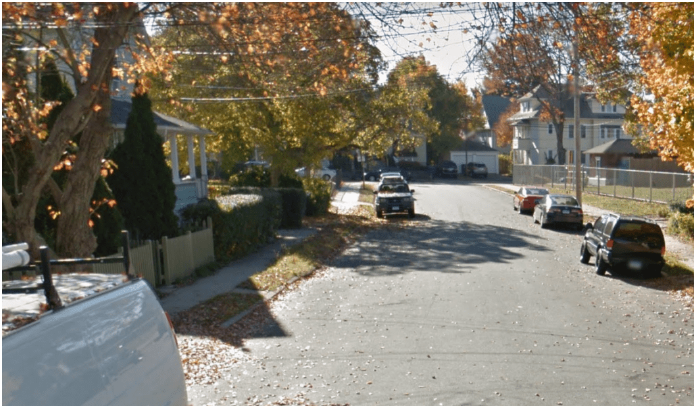BRIDGEPORT — When Andrea Schley started working with refugees at the Burroughs Community Center several years ago, she realized how difficult it was for the women to find housing.
Her solution: buy a house and rent them a space to live.
“I was just struck by these women working so hard and having such awful housing and being treated so poorly by landlords that I talked my husband into buying our first house there,” said Schley.

Schley and her husband purchased a house in the city’s Black Rock neighborhood for about $425,000, and rented it out to a family of refugees from Burkina Faso.
Andrea said that the first house worked out so well that she and her husband decided to purchase a second house for about the same price, which they are now renting out to a multi-generational family of 11 who fled Afghanistan after the U.S. military pulled out of the country in August 2021.
As a condition for speaking to us, the family asked that their last name not be used in this story for reasons of safety.
The family includes a husband and wife, Khan Aqa and Lailuma, the couple’s five daughters, a son in law, and their three children.
The refugee families are good people and who work multiple jobs and deserve to be treated with decency, explained Schely’s husband Daniel, who said that they have taken landlords to court when refugees have lost their security deposits.
“What motivated all of this is the propensity on the part of certain landlords in Bridgeport having a business model that takes advantage of refugee families,” said Daniel. “It’s a business model that basically over-charges, under-delivers and steals the security deposit. And these families have absolutely no recourse.”
Andrea referred to her own business model as “terrible” — purchasing the houses, then investing an additional $50,000 in each one for things like painting, purchasing appliances, putting in air conditioning and bringing the homes up to code, and then charging what she estimates would be about 75 percent market rent. Schley charges about $1,500 per month for each of the house’s three two-bedroom units, but said the goal wasn’t to make money, just to break even.
According to a recent report released by the National Low Income Housing Coalition, a renter in Black Rock would need to make $26.15 an hour – or about $54,400 a year – to “comfortably” afford one 2-bedroom apartment.
Ann O’Brien, director of community engagement and co-sponsorship at Integrated Refugee and Immigrant Services, a New Haven-based nonprofit, said that she sees landlords like the Schleys as part of the solution to finding housing for refugees – a challenge that in some cases only grows a year after their arrival.
In the case of refugees from Afghanistan, the large influx into the state after the abrupt American departure last August meant that the agency had to quickly find temporary housing for these families, even if it meant putting them in places where the rent was high, said O’Brien.
“A family of seven with very low levels of formal education and [a] mom and dad with low levels of English cannot afford a $3,000 bed apartment in Stamford. But, at the time, that was literally all we could find,” she said.
The challenge of finding housing reflects the larger difficulty in Connecticut of affordable housing, a shortfall exacerbated by recent hikes in rental prices. Data from the U.S. Census Bureau shows that Connecticut has the lowest apartment vacancy rate in the country, at 2.1 percent. The Bridgeport metro area, where Schley is located, has the fourth lowest vacancy rate of the nation’s 75 largest cities — 1.5 percent.
O’Brien said the agency’s current challenge is moving some refugees to homes that they can afford long-term. She said the agency is looking for “creative ideas” to solve the problem, and has spoken with mayors of cities like Hartford, New Haven and Middletown about how to provide for refugees.
“We have to start getting super creative and we have to start partnering at a city level and at a landlord level that we haven’t done before,” she said.
“Starting from zero”
Hosay, the oldest of the family’s five daughters at 29, and her 24-year-old sister Basmina, said that when the family left Jalalabad, a city in Afghanistan’s eastern province of Nangarhar, they left behind a six-story house that had 12 rooms and 13 washrooms and three kitchens. The family had just decorated it with new furniture and Turkish rugs.
They left with only the clothes they were wearing. But staying wasn’t an option.
Hosay at the time worked for the Norwegian Refugee Council, an international organization that worked with Internally Displaced Persons in Afghanistan and her father was a Regional Manager of the Afghani Women’s Network in the Eastern Zone of Afghanistan. Hosay said they received a threatening letter from the Taliban in April 2021, telling them that they would face a “serious reaction” if they didn’t stop going to their jobs.
Hosay said she and her father worked from home for two months. When she returned to the office, she took security precautions — leaving her home at different times of the day, changing her clothes and always riding in a different car with a different driver.
In August, when the Taliban took over, Hosay and her family went to the airport in Kabul. She said they boarded a plane with absolutely no idea where they were going to end up.
“We were thinking … ‘a lot of people they took to Qatar, so maybe they’re taking us to Qatar, or maybe they’re taking us to Italy or Germany, something like that.’ We didn’t know anything … We were [just] counting the hours,” said Hosay.
After coming to the U.S, Hosay said, the family was worried that the six of them might end up crammed into a small space. Instead, they ended up in the three-story, six-bedroom house on a quiet street in Bridgeport.
Hosay said that Andrea and Daniel have been more than just landlords to them.
“[They are] so supportive. Emotionally, financially — every type of support they gave us [when] we came. They were the people that … showed us a good way to settle ourselves here,” said Hosay.
The couple also helped her and her sisters and her brother-in-law find jobs. Hosay works as an account payroll administrator for a local non-profit, and her brother-in-law works in research. Basmina, who was a doctor in Afghanistan, will start work as a radiology technician’s assistant at Bridgeport Hospital in September.
Hosay said that housing represents one of her biggest costs, especially given that her parents are elderly and have health problems, meaning that they are unable to work. Government assistance and support from their family’s sponsor circle — a group of individuals who commit to helping refugees obtain basic necessities, secure jobs and settle into the community — has helped supplement that cost, but that assistance is about to end, in order to help transition the family to self-sufficiency. The organization, which agreed to help the family with rent for a year, is now in the process of preparing to welcome another family.
Hosay and her family have advantages — when they came to the U.S, she and her siblings were well-educated, and spoke English well. Hosay and Basmina were able to find work that paid reasonably well and matched their professional experience.
But Hosay said that she does worry about paying her bills. With her parents unable to work because of poor health and lack of English, one sibling about to start school at Fairfield University in the fall and another who sends money home to her husband in Afghanistan, they will be responsible for paying the rent for two units — about $3,200 a month — in addition to the family’s other expenses.
John McGeehan, founder and chair of the Interfaith Refugee Resettlement Committee, a coalition of faith groups that served as the family’s co-sponsor, told CT Examiner that the coalition had helped pay for the sisters to take English classes at Housatonic Community College. He said that the family’s English and education gave them unique opportunities, but the challenge would be a change in mindset — in Afghanistan, the young adults are accustomed to saving for themselves, but now they had to concentrate on taking care of the entire family.
Hosay said she wished there was more support for housing long-term. She said all the expenses mean a tight budget for the family — avoiding luxuries they might have been able to afford in Afghanistan, like going out to eat, or buying fruit. It also means less invested in other things, like furthering education or purchasing a car.
But she said her family wants to stay in the house where they are. She said it’s a good neighborhood, and that the neighbors are kind and sometimes offer to give them rides in their cars, or invite them over to their houses.
“Adjusting is difficult, because we are starting again from zero, you know? While you are starting from zero, you need money for everything,” said Hosay.
“They can’t go back”
O’Brien said that part of her work helping refugee families find affordable apartments is communicating with landlords about the particular traits and needs of these families.
“You have to talk to the landlords, explain to them — you’re not just looking at any old family.
These are refugee families. They’re the salt of the earth, right? They are just exactly the families you want in your community,” said O’Brien.
But city leaders say that working with landlords is only part of the solution.
Mayor Ben Florsheim of Middletown said that while he understood the importance of finding the “sympathetic landlord” to rent from, the amount of available housing in an area also makes a difference.
Florshiem said that Middletown, which has settled two refugee families from Afghanistan, was in the process of several projects that would bring more housing units into the city, which he said he believed would help refugee families.
“They are in the same sort of position as anybody else in the market — just facing the additional challenges of, oftentimes, a language barrier for some family members, cultural barrier, getting into the workplace,” he said.
Mayor Justin Elicker of New Haven agreed that the lack of affordable housing is something that doesn’t just affect refugees — he said it’s one of the biggest complaints his office receives from residents in general.
“The waiting list for public housing is thousands and thousands of people long,” said Elicker.
Because of that, he said, any solution can’t just be one specific to the needs of refugees; it needs to help the city as a whole. Elicker said that the New Haven Board of Alders recently passed legislation that would require new developments to offer a percentage of apartments at 50 percent of the median income. He said that the city was also dedicating some of its federal coronavirus relief funds toward rental assistance for tenants.
Florsheim said he also believed that there needed to be more support for refugee agencies like IRIS, and more federal and state investment in housing.
Florsheim said that having refugees in Middletown adds to the diversity that is one of the city’s assets.
“What people love about [Middletown] is its diversity, in every sense of that word,” he said. “There’s so many types of community here, and having exposure to other cultures, having a spirit that is about helping one another and supporting people who are struggling and helping them become a fully realized part of the community … that’s something that I think Middletown prides itself on, and we’re good at it.”
O’Brien said she had also spoken with Mayor Luke Bronin in Hartford about the possibility of talking with landlords, housing agencies and “community-based funders” about properties in the city that needed to be redeveloped.
This aid may be critical for many Afghan families seeking to remain in the country beyond the two-year time limit granted by a humanitarian visa.
Earlier this month, a group of U.S. Senators including Sen. Richard Blumenthal, introduced a bill that would make it possible for Afghan refugees who came to the U.S. on humanitarian parole to apply for permanent legal status.







